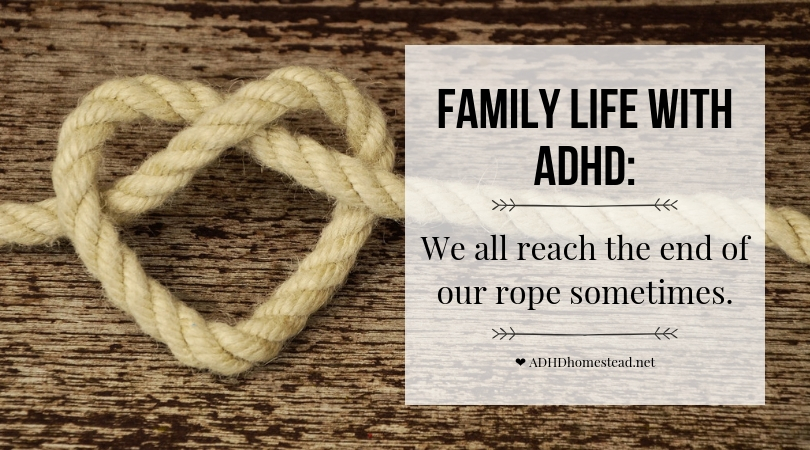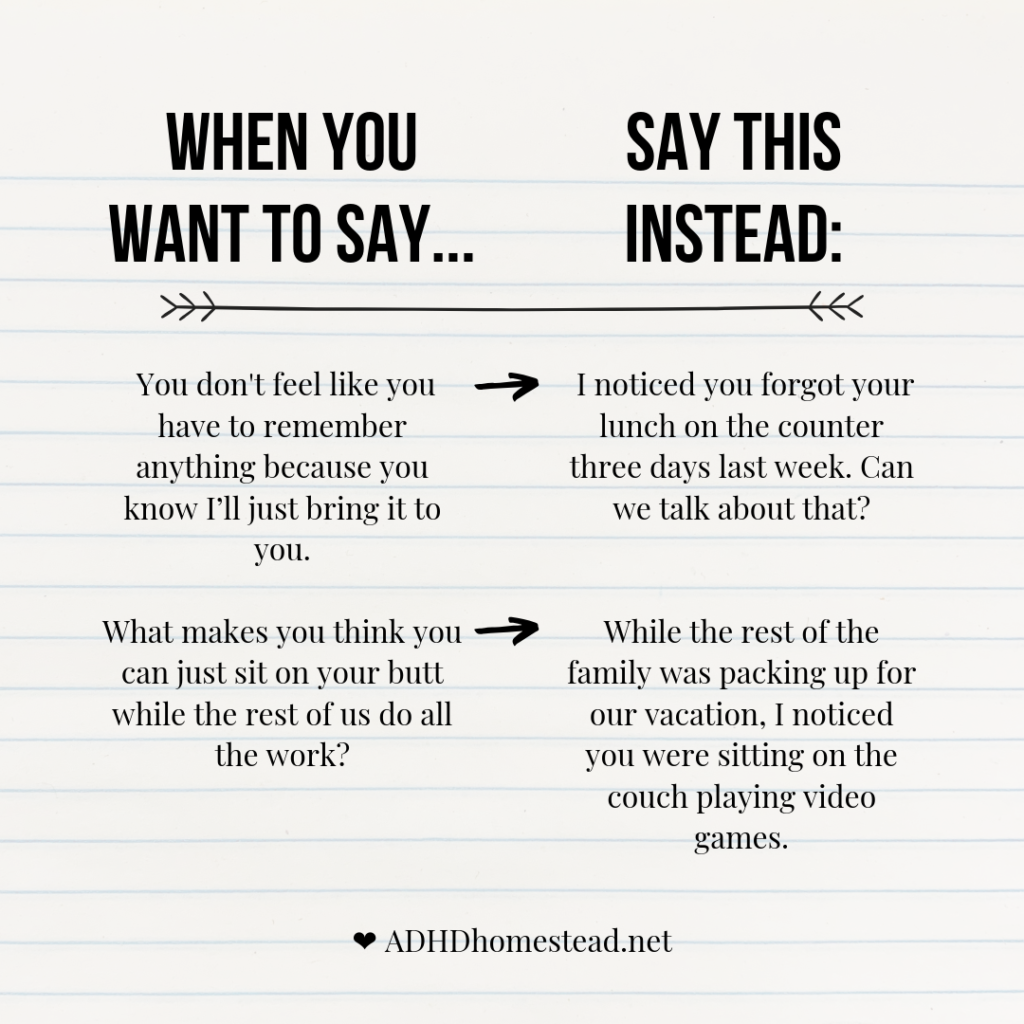Editor’s note: this post was updated on June 9, 2021 to include audio narration, remove ableist language from the title, and make minor readability edits.
Life with ADHD gets really hard sometimes. That includes our own ADHD and all the ADHD under our roof. We’re all human. Every once in a while, the ADHDers in our life drive us to a breaking point.
And what do we do when we feel completely fed up? My husband recently lost his patience with our son and told me, “I’m not giving him an inch.”
This is a perfectly natural reaction to someone who’s gotten on our last nerve. ADHD feels unfair sometimes. I’ll confess to insisting, in moments of complete exasperation, that from this point forward I will stand for no bad behavior. None. Not one bit.
Most of us have been there. We’ve yelled at a spouse and told them this is the last time we tolerate them coming home late, spending money without checking with us first, leaving laundry on the floor, rear-ending someone on the way into work (late). We’ve yelled at our kids like we’re running a boot camp. The message: this has gone on too long. Your behavior had better be exemplary from now on.
But how productive is this, really?

Everyone’s doing their best.
Most of us do the best we can on any given day, even though ADHD can make this difficult to believe. In those times of frustration and doubt, it can help to remember: many people with ADHD develop key life skills later than our peers. Some won’t develop them at all without proper treatment. These skills include:
- Regulating emotional responses
- Thinking before we speak
- Looking at a situation from another person’s perspective
- Predicting how our words and actions might impact others
- Organizing our routines and behaviors
What feels second nature to others may feel completely incomprehensible to us.
I once got frustrated with my five-year-old son when, for the gazillionth time, he was taking forever to get dressed after swim class.
“Look around,” I told him. “This locker room is empty. Everyone else has already changed and gone home and you’ve barely started.”
He burst into tears and sat down on the bench.
“But I don’t know how they do it,” he wailed. “I don’t know how they’re so fast, I don’t know how to get changed that fast, it’s like they’re all lightning bolts and I don’t know how to be a lightning bolt.”
Then I realized: he actually did care that he had made me angry. He cared that everyone else changed and left the locker room before he even got his thoughts in order. And he wanted to do better but he had no idea how to begin.
This interaction with my kiddo reminded me that people usually don’t try to frustrate us. Most humans want to please the people they love. What feels like blatant disregard may actually be the best effort someone can make at a task that feels impossible.
When we ascribe all kinds of negligent and inconsiderate motives to the behavior, we only make them feel worse.
ADHD requires constant troubleshooting, not judgment.
I often compare efforts to fix problems with our habits and routines to repairing a computer or a car. If my computer malfunctions, I don’t see this as confirmation of its ineptitude at the basic job of being a computer. I go through a methodical process to isolate the problem and fix it. This is called troubleshooting.
Yet when our organizational systems falter, we often jump straight to judgment and self-loathing. The failure didn’t happen because part of the system needs repair. It happened due to our fundamental inadequacy. If you read my most recent post, you might recognize the fixed mindset here: assuming mistakes and failures indicate a fundamental limit in ourselves, rather than an opportunity to learn.
When we talk to our family — or ourselves — this way, we imply no amount of hard work will fix this problem because the problem is innate. Yet we proceed to insist the accused try harder anyway.
We need to change the way we talk about problems.
Of course, when we reach the end of our rope we often feel the problem is fixed and innate. So much so that we struggle to speak about it in productive terms.
I’ve learned to counteract this by observing behaviors and emotions without accusation or judgement. For example:
- I noticed you forgot your lunch on the counter three days last week. Can we talk about that?
- Wow, something about what I said really upset you.
- While the rest of the family was packing up for our vacation, I noticed you were sitting on the couch playing video games.
- Your teacher told me you had a rough time in music class today.
None of these statements let the subject off the hook, but neither do they ascribe motivation or make assumptions. The pause that follows leaves a safe space for conversation. The best statements get your message across without saying anything the other person might interpret as untrue or unfair.

Speak clearly about how others’ behavior affects you.
Many people worry more open-ended, empathetic communication will require them to bury their own feelings of hurt and injustice. Not so. After you state the problem objectively, you have a right to talk about how it makes you feel. For example:
- When I have to drop your lunch off for you, that takes 45 minutes out of my work day. I’m afraid I’m going to have to start working late or bringing work home in the evenings if I keep getting interrupted like that.
- When you yell at me, my heart starts racing and I get really upset. It takes me a long time to stop feeling hurt, even after you’ve calmed down and apologized.
Imagine the difference if you say, “I’m sick of everyone using me as their own personal courier service. None of you feel like you have to remember anything because I’ll just bring it to you.” Now people feel personally attacked. You’ve accused them of forgetting important items because they don’t care enough about you. This will focus their energy on defending their character instead of talking about the actual problem.You want everyone talking about the actual problem. Troubleshooting. Then you can discuss possible solutions together and evaluate a few to try (just remember that if at first you don’t succeed, it doesn’t necessarily mean the idea was bad).
Be realistic about your expectations, but also your sacrifices.
Everyone benefits from an objective, empathetic approach to solving problems. When something isn’t working it doesn’t mean it will never work, just that we need to make a few changes before we try again. When we resist the urge to label, shame, and blame, we stand a chance of making real progress.
But.
You may remember I started this post talking about reaching the end of your rope. Sometimes we get there. And while a troubleshooting approach and a willingness to listen will help solve more problems, you can’t be the only one working hard and making sacrifices.
That is to say, the ADHDers in your life probably aren’t trying to make you miserable. We do the best we can. Mistakes and failures don’t make us bad people. But that doesn’t mean you should expect — or that you deserve — to be treated badly.In other words: pick your battles. An overwhelmed and demoralized ADHDer is often a paralyzed (or defensive, or blame-shifting) ADHDer. That’s a tough place to be. However, stay firm on your priorities. Set boundaries for your own sanity. Take time for yourself before you burn out. You should never feel like you need to sacrifice your personal life or happiness to compensate for someone else’s chaos. Be kind, but also firm. Troubleshoot, but don’t be afraid to express how a behavior affects you and follow through on a consequence.
Rope image credit: congerdesign from Pixabay
Hey there! Are you enjoying The ADHD Homestead?
Here's the thing: I don't like ads. I don't want to sell your attention to an advertising service run by the world's biggest data mining company. I also value my integrity and my readers' trust above all, which means I accept very few sponsorships/partnerships.
So I'm asking for your support directly. For the cost of one cup of coffee, you can help keep this site unbiased and ad-free.
Below you will find two buttons. The first lets you join our crew of Patreon pals and pledge monthly support for my work. Patrons also have access to my Audioblogs podcast. The second takes you to a simple donation page to pledge one-time or recurring support for The ADHD Homestead, no frills, no strings. Do whichever feels best for you!
